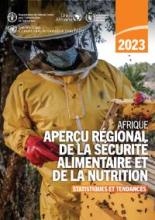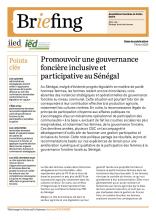Land Library Search
Through our robust search engine, you can search for any item of the over 73,000 highly curated resources in the Land Library.
If you would like to find an overview of what is possible, feel free to peruse the Search Guide.
/ library resources
Showing items 1 through 9 of 1148.L'Afrique est confrontée à une crise alimentaire d'une ampleur sans précédent.
Ce papier constitue une synthèse des acquis et des handicaps de la restauration des paysages forestiers et régimes fonciers au Cameroun.
En retraçant la vie sociale du concept d’observatoire foncier en contextes africains, l’objectif de cette étude est d’analyser l’émergence, l’évolution, la mise en œuvre et les effets des observatoires fonciers sur l’action publique foncière.
Au Sénégal, malgré d’évidents progrès législatifs en matière de parité hommes-femmes, les femmes restent encore minoritaires, voire absentes des instances stratégiques et opérationnelles de gouvernance foncière au niveau communal.
Glocalizing land-use and forest governance implies in advancing equitable research partnerships between institutions in the Global South and Global North, and strengthening a community of practice for critical enquiry and engagement in partnerships for sustainable development.
Agriculture is widely recognized as a solution to food insecurity and poverty, especially in rural areas. However, 75% of the world’s poor live in rural areas, and agriculture is the primary source of their livelihood.
Since the global crises in the 2000s, many foreign and domestic actors have acquired large tracts of land for food and biofuel crop cultivation and other purposes in Africa, often leading to the displacement of the African people living on customary land.
With over 14 million hectares allocated, Vietnam’s forest and forestland allocation has been one of the largest natural resource decentralization programs in the developing world over the last three decades.
Land expropriation has always been a hot spot of social conflicts. The land expropriation policy of Merging Villages and Living Together (MVLT) in rural areas has intensified conflicts due to insufficient financial compensation and “demolishing old houses before building new ones”.









